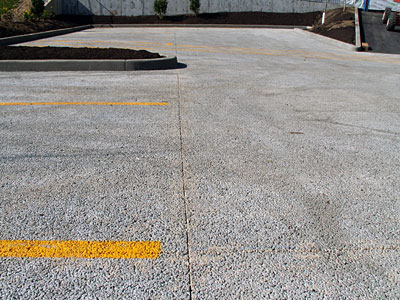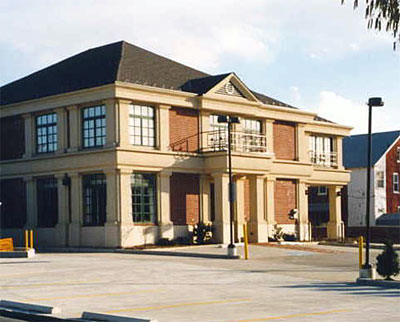Benefits
Economic Benefits
Benefits | Attractive | Economic | Environmental | Structural | LEED
Alternative to Costly Stormwater Management Methods
 Parking areas paved with pervious concrete reduce the need for large detention ponds, because the pavement itself acts as a detention area. Parking lot owners that use pervious will spend fewer dollars on the labor, construction, and maintenance of detention ponds, skimmers, pumps, drainage pipes, and other stormwater management systems. Expensive irrigation systems can also be downsized or eliminated. In reducing runoff from paved areas, pervious concrete reduces the need for separate stormwater retention ponds and allows the use of smaller-capacity storm sewers. This allows property owners to develop a larger area of available property at a lower cost.
Parking areas paved with pervious concrete reduce the need for large detention ponds, because the pavement itself acts as a detention area. Parking lot owners that use pervious will spend fewer dollars on the labor, construction, and maintenance of detention ponds, skimmers, pumps, drainage pipes, and other stormwater management systems. Expensive irrigation systems can also be downsized or eliminated. In reducing runoff from paved areas, pervious concrete reduces the need for separate stormwater retention ponds and allows the use of smaller-capacity storm sewers. This allows property owners to develop a larger area of available property at a lower cost.
Stormwater Impact Fees
Many government agencies are now implementing stormwater impact fees for all impervious areas. As regulations further limit stormwater runoff, it is becoming more expensive for property owners to develop real estate, due to the size and expense of the necessary drainage systems. Pervious concrete can reduce these fees for the property owner by helping to minimize demands upon sewer systems.
Developers are using pervious concrete for parking areas in order to increase utilization of commercial properties. The land ordinarily devoted to costly stormwater management practices or compliance with maximum impervious area ordinances can now be developed or preserved, enhancing the bottom line.
Supports Local Economies

Concrete mix designs are adaptable to different regions, able to make use of available materials for course aggregates and other ingredients. Concrete also requires a relatively low transport time in order to avoid solidification. Therefore, its use in construction minimizes transportation costs and related energy consumption. Choosing pervious concrete supports local economies by requiring nearby companies for transport and placement, and by making use of regional materials.
Low Life-Cycle Cost
Concrete pavements have a significantly lower life-cycle cost than alternatives such as asphalt. Although the initial cost of pervious installation may be slightly higher, concrete saves money in the long run due to its superior durability and strength. It requires fewer repairs than asphalt, and has a longer overall lifespan as well.
Pervious concrete is also economical in that it minimizes the need for runoff retainers, reducing property costs. There is very little overproduction since it is made directly on-site and as-needed, and it can be recycled once it has reached the end of its life-cycle. Thus pervious concrete is widely recognized as the lowest life-cycle cost option available for paving.


